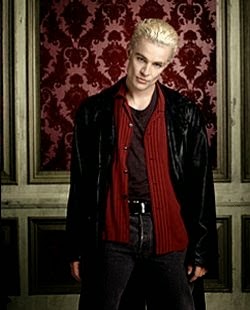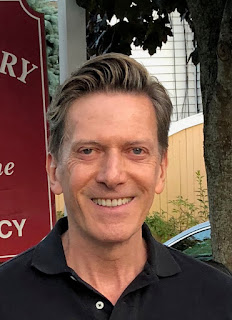I Wanted Spike…I Got a Spazz: The Joys of Casting
Now that the show is cast, I'm going to try my darndest to give you a peek behind the curtain as we move into the rehearsal process.
Beginning with something that I was reminded of during auditions, when we had the great pleasure of hearing so many talented actors' different interpretation of the text. (And the great heartbreak of not being able to cast more actors! Damn that playwright and her limited number of characters!)
When someone knows that I have a show going up, they often lean over to me and whisper: "It must be so exciting to hear your words spoken!"
And it is.
More often, though, what excites me is the actor saying those words, and the choices s/he has made.
I'll give you one of my favorite examples:
 |
| Spike. Infiltrating. |
We were in auditions for my play, Curses! which is a riff on Sleeping Beauty. The basic premise of the show is that the King and Queen forgot to get their daughter cursed, and now on the Princess' 16th birthday they bring in the resident "bad fairy," Hexmaker Gloamingwand, to do the job. The snag, of course, is that Hexmaker's mother is tired of her son's mischief and is trying to get him to go on the straight and narrow.
So.
As the character of Hexmaker was traipsing through my mind, I was envisioning a sort of laid-back super-cool punk, à la Spike from Buffy the Vampire Slayer. (Spike from Buffy infiltrates a lot of my writing. As well he should.)
All well and good.
Cut to the day of auditions. I had written the show for the inaugural "Eighth and Ninth Grade Play" - since the primary theater teacher and myself both agreed that it would be beneficial to give some of the talented up-and-comers the opportunity to shine. (We had just suffered through a bloodbath for the other mainstage shows - both musical and classical theatre - and a lot of talented but just not quite underclassmen had been cut. This show rectified that.)
As my stage managers and I sorted through the audition sheets, prepping who would read what, one young actor approached me and asked if he could try Hexmaker.
"Sure!" I answered, and handed him the sides.
His friends prodded him in the back, and the young man spoke again.
"It's just that, Miss Snyder, I was wondering…"
"Hm?"
"Well, I had this idea - I wanted to try, if it's all right. I have this voice in my head - but I think it's really different from what you wrote… But if it's OK…"
"Don't tell me," I said. "Just try it."
 |
| I am Hexmaker Gloamingwand! I turn princes into slavering monsters; I take one half of all the socks; I make you lose your keys! |
Auditions continued and we came to his scene as Hexmaker. There were a few lines before his, and thus far everyone's choices were more or less in line with what I had expected. Hexmaker's opening speech approached. My crew and I settled in to see what was "Really different."
And the young man opened up his mouth, the young man with the dark hair and fair skin, the young man who - up to this point, had only been in one silent (if hysterically funny) role for me - opened up his mouth…
…and whined.
It was great! He had all the look of a sulky punk, and all the attitude of Steve Urkel. His voice, which was typically low, mellow, even a touch mumbly at that point in his life, he stuffed into his nose and rose about an octave higher. And his body, which again he typically kept in "slumped high school normal" became something like an elastic band about to break.
It was about as far from my inner playwright's initial vision as could be conceived.
It was also genius.
Compare that to when we cast for King of Fools, a musical I wrote based on Grimms' King Thrushbeard. (Think Taming of the Shrew à la Bavaria.)
In that casting, we had a young man who came in and owned the comic role of Raoul, King Thrushbeard's servant. Every word out of his mouth sounded just like I'd heard in my fever-writing brain. It was startling. Even more startling since he had just played Scrooge for us in A Christmas Carol.
We cast him right away.
And learned right away that any moment that wasn't quite funny enough in the text, could be filled up in an instant with one of his quotables For example, in our character work, he decided that Raoul had been stolen as a child from England by the Saxons and brought to our fictional principality in Italy. To hear him shout: "SAXONS!" as he ran across the stage was just stupidly funny, and has since made it into the revised script. Similarly, it was he who first uttered the line that now lives in Math for Actors, "There's a lot of things that you can eat that are not made out of food."
The key in casting your own work is the same key to casting any text: remaining open to what the Divine, the Universe, and an Actor's fertile brain throw at you.
I may go into auditions for And Then There Were None certain that we're looking for a man to play the doctor, and come out stunned by the complicated neuroses that a woman brings to the part. (Which happened.) Or I may go into auditions for The Tempest, thinking that so-and-so from my usual stable of actors may slip into the parts of Miranda and Ariel, only to find that two young women who tended to play the "pants roles" before, are the most luminously feminine and ethereal of them all.
So, do I enjoy hearing my words spoken aloud? Sure, I guess.
But every text ever written is only a fourth complete. It's the blueprint, but not the materials, nor the carpenters, nor the inhabitants. Nor, later, the tour guides and the tour!
If the words I throw together are worth saying, worth giving breath, then hopefully they're worth an infinity of variations: they're worth mucking about with.
And how a fellow artist mucks about is the most fascinating thing of all.
Were everything how I envisioned it, the piece is dead already. Were everything limited to what I can imagine, then it will never spark imagination in anyone else. Were everything limited to my experience of the world, and the transmission of my experience alone, then I am living in a world of one.
And theatre is anything but a world of one: it is a world that transcends the borders of ourselves to work with one another, to build with those who have done the work before, to play with those whom the world calls "dead" - but whose work is very much alive.
We've got a terrific cast for this Valentine's Day. Folks who came in and blew me away with their work. I'm looking forward to exploring the world with them - and even more excited for when we open that world to you.
Hope to see you there.


Comments
Post a Comment